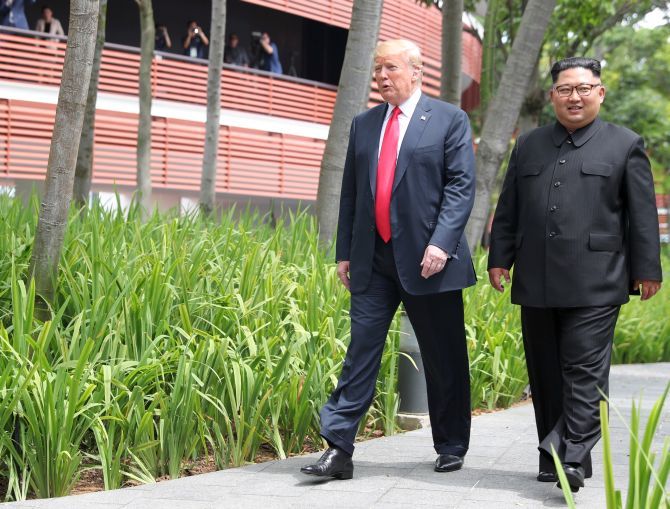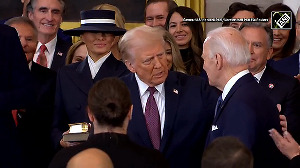'North Korea could choose to go China's way by selectively opening up the economy, but Kim does not seem enthused by the idea.'
'Getting Pyongyang to give up the nuclear programme may be the best outcome Trump can hope for at the moment,' says Vikram Johri.

An excellent 2015 film, Kim Jong-un: The Unauthorized Biography, currently streaming on Amazon Prime Video, gives us a preliminary assessment of the man in charge of the Communist nation.
The documentary presents interviews with defectors from the nation and Western experts to build a comprehensive portrait of the man whose decision to shut down his country's nuclear programme is a highly anticipated outcome of the Singapore summit.
The picture that emerges is not encouraging; it is of a ruthless man who is more concerned with presenting a martial image of his country than about the welfare of his countrymen.
Mr Kim is the second child of Kim Jong Il, the Supreme Leader from 1994 to 2011, and the woman many believe to be his father's favourite mistress, Ko Yong Hui.
He was sent to school in Berne, Switzerland where he picked up German and basketball, a sport he excelled at.
His identity was kept secret at the time -- records show that he passed as the son of an embassy employee.
His father Jong Il kept poor health during the 2000s, so much so that Korean and American intelligence agencies wondered if the man who appeared in public might be a stand-in for the real leader who had passed away.
These reports were never confirmed and Jong Il's health is believed to have seriously deteriorated in 2008 when he suffered a stroke.
In 2010, Mr Kim was unofficially declared next in line to the country's leadership. The next year, his father died.
In keeping with Western reporting conventions, the documentary calls archival footage from the country 'propaganda'.
One such sequence shows Mr Kim walking next to his father's hearse accompanied by the senior-most generals of the army and to loud wailing from the common public.
Within a few years, nearly every army man in the scene had been purged as Mr Kim built his own coterie of trusted yes-men.
His ruthlessness is most diabolically displayed in getting rid of members of his own family.
The documentary was made before the dramatic murder of Mr Kim's half-brother Kim Jong Nam at Kuala Lumpur international airport in 2017, but it does present a detailed account of the trumped-up charges against and fake trial of his uncle, Jang Song Thaek, who was executed in 2013.
Mr Jang, as a close associate of Kim Jong Il, was close to the seat of power, and Mr Kim followed up his execution with that of his entire extended family.
As a Communist country, North Korea has one of the world's worst indices of development, which are especially glaring when compared with the prosperity of the democratic South.
Yet, Mr Kim has devoted all the country's resources in sprucing up its non-conventional weapons capability.
Given that his country's conventional capacity is restricted to obsolete, Soviet-era weapons, Mr Kim calculates that the only way he can effectively ward off the American threat is through nuclear weapons.
David Maxwell, an associate director at Georgetown University, presents the North Korean nuclear weapons programme as a direct result of this fear and the knowledge of the fate that other dictators without the nuclear option, such as Nicolae Ceausescu, Muammar Gaddafi and Saddam Hussein, have met at America's hands.
But nuclear is only one part of North Korea's unconventional arsenal.
While the country tested its first nuclear bomb in 2006, its advanced cyberattack capabilities are of more recent origin.
Most famously, in 2016, it hacked the servers of Sony and released a trove of data including e-mails from senior executives, after the company produced a film that mocked a character based on Mr Kim.
What, then, is the future of North Korea?
The country could choose to go China's way by selectively opening up the economy, but Mr Kim does not seem enthused by the idea.
Some analysts have wondered if a rapprochement between the North and South might be in the offing. Mr Maxwell dismisses any such claim.
In April, former South Korean president Park Geun-hye was sentenced to 24 years in prison on corruption charges. "They don't believe they will be given a future in South Korea," says Mr Maxwell of North Koreans.
"When the South sends its own presidents to jail, the North can only imagine what they would do to a regime accused of crimes against humanity."
The documentary's final verdict: We may have reached the end of history as far as Communism is concerned, but it would be a mistake to take North Korea lightly.
Getting them to give up the nuclear programme may be the best outcome Mr Trump can hope for at the moment.
Putting in place the contours of a long-lasting détente between North and South Korea will take months, if not years.












 © 2025
© 2025